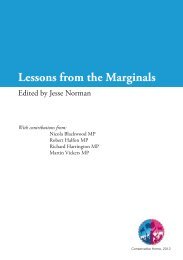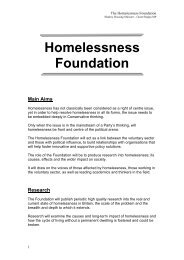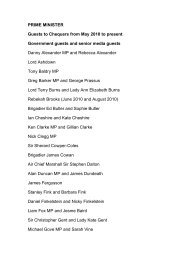David Cameron speech on global poverty - Conservative Home
David Cameron speech on global poverty - Conservative Home
David Cameron speech on global poverty - Conservative Home
Create successful ePaper yourself
Turn your PDF publications into a flip-book with our unique Google optimized e-Paper software.
<str<strong>on</strong>g>David</str<strong>on</strong>g> <str<strong>on</strong>g>Camer<strong>on</strong></str<strong>on</strong>g> <str<strong>on</strong>g>speech</str<strong>on</strong>g> <strong>on</strong> <strong>global</strong> <strong>poverty</strong><br />
Speaking today in Oxford to an audience of Oxfam supporters, <str<strong>on</strong>g>David</str<strong>on</strong>g><br />
<str<strong>on</strong>g>Camer<strong>on</strong></str<strong>on</strong>g> will say:<br />
Check against delivery<br />
“For too l<strong>on</strong>g, politics in this country treated <strong>global</strong> <strong>poverty</strong> as a<br />
sec<strong>on</strong>dary issue.<br />
C<strong>on</strong>servatives used to regard it as a significant, but sec<strong>on</strong>d-order subject.<br />
Labour have helped to raise its significance, and we should all<br />
acknowledge the pers<strong>on</strong>al commitment and leadership of T<strong>on</strong>y Blair and<br />
Gord<strong>on</strong> Brown in doing so.<br />
Al<strong>on</strong>g with the vital role played by campaigning organisati<strong>on</strong>s and the<br />
many thousands of individuals who rallied to the banner of Make Poverty<br />
History…<br />
…this has helped create something of which every<strong>on</strong>e in Britain can be<br />
incredibly proud.<br />
Last year, this country led the way in beginning, finally, to make <strong>poverty</strong><br />
history.<br />
We should never forget the internati<strong>on</strong>al leadership Britain has shown.<br />
Not just our politicians but our NGOs, large and small, and our anti<strong>poverty</strong><br />
campaigners.<br />
People have often been ahead of the politicians – as we saw with the<br />
incredible generosity of the resp<strong>on</strong>se to the Tsunami.<br />
Earlier this week, the Prime Minister spoke about where we are, <strong>on</strong>e year<br />
<strong>on</strong> from Gleneagles.<br />
And today, Bob Geldof and DATA will give us their assessment of how<br />
far the promises made have been h<strong>on</strong>oured.<br />
Clearly we have seen some real progress.
Britain has taken the lead.<br />
But where are the other G8 countries<br />
The spirit of Gleneagles 2005 was not meant to be British pushing and<br />
cajoling other developed nati<strong>on</strong>s into line.<br />
It was supposed to be about a shared commitment to a better world.<br />
But world trade talks remain deadlocked, in large part because of the<br />
short-sighted protecti<strong>on</strong>ism by rich countries.<br />
If you take out m<strong>on</strong>ey for Iraq and Nigerian debt cancellati<strong>on</strong>, aid from<br />
Germany and France actually fell between 2004 and 2005.<br />
And despite some real progress, too many politicians in Africa c<strong>on</strong>tinue to<br />
put their own interests before those of their people.<br />
Making Poverty History is a task for which we all must share<br />
resp<strong>on</strong>sibility.<br />
Britain is doing a lot; now other governments must meet the challenge.<br />
We should do justice to the progress made last year by strengthening<br />
those early faltering steps.<br />
By going further, and faster.<br />
And by resolving that whatever the ups and downs of our domestic<br />
politics, Britain will seek always to be in the lead in the great struggle to<br />
rid the world of <strong>poverty</strong>.<br />
Today I want to explain how.<br />
To make a C<strong>on</strong>servative c<strong>on</strong>tributi<strong>on</strong> to the debate.<br />
But first I want to talk about why.<br />
A MORAL IMPERATIVE<br />
For my generati<strong>on</strong>, <strong>global</strong> <strong>poverty</strong> is <strong>on</strong>e of the central challenges of our<br />
time.
I came into politics to help make our country a better place to live.<br />
But I d<strong>on</strong>’t believe it is either morally acceptable or politically sensible to<br />
limit our ambiti<strong>on</strong>s to improving the well-being of our citizens.<br />
As I learn more and more about the issues that affect our country, our<br />
c<strong>on</strong>tinent and our world, I recognise with increasing clarity the need to<br />
take a <strong>global</strong> view.<br />
It is why <strong>on</strong>e of the principal aims set out in Built to Last, the<br />
C<strong>on</strong>servative Party’s new statement of aims and values, is to do all we<br />
can, al<strong>on</strong>gside the many others who share our aims, to fight <strong>global</strong><br />
<strong>poverty</strong>.<br />
The prominence that we’re giving to the challenge of <strong>global</strong> <strong>poverty</strong> is<br />
right for our times and right for this time in history.<br />
In the 19 th century, we witnessed the great ec<strong>on</strong>omic struggle between the<br />
rise of industrialisati<strong>on</strong> and the decline of the agrarian society.<br />
In the twentieth century, we saw that great ideological battle between left<br />
and right.<br />
And the fundamental challenge for the twenty-first century will, I believe,<br />
be a moral <strong>on</strong>e: how can we bring the rich world and the poor world<br />
closer together<br />
I describe it as a moral challenge because that, for me, is first and<br />
foremost what it is.<br />
It is morally unacceptable for billi<strong>on</strong>s of people to live in dire and<br />
degrading <strong>poverty</strong> when we now know the secret of wealth creati<strong>on</strong>.<br />
ENLIGHTENED SELF-INTEREST<br />
But it’s not just a questi<strong>on</strong> of values, rights and morality.<br />
It is also a questi<strong>on</strong> of hard-headed political and ec<strong>on</strong>omic reality.<br />
It is, frankly, a questi<strong>on</strong> of enlightened self-interest.<br />
The world is smaller that ever before.
With the rise in mass migrati<strong>on</strong>, the revoluti<strong>on</strong> in communicati<strong>on</strong>s<br />
technology, and the transformati<strong>on</strong> in our understanding of the planet’s<br />
envir<strong>on</strong>ment…<br />
…we are truly <strong>on</strong>e world.<br />
Every night, hundreds of Africans arrive <strong>on</strong> Europe’s southern shores.<br />
They d<strong>on</strong>’t want to leave their homes.<br />
But when <strong>poverty</strong> forces mass migrati<strong>on</strong> <strong>on</strong> a scale never seen before, we<br />
must recognise that tackling <strong>poverty</strong> is not just a moral imperative.<br />
It is a security imperative; an immigrati<strong>on</strong> imperative; an imperative we<br />
cannot ignore if we want str<strong>on</strong>ger, more cohesive communities in all our<br />
countries.<br />
CONSERVATIVE COMMITMENT<br />
So for all these reas<strong>on</strong>s, I am passi<strong>on</strong>ately committed to producing a<br />
comprehensive, ambitious policy programme <strong>on</strong> internati<strong>on</strong>al<br />
development.<br />
That is why I established the Globalisati<strong>on</strong> and Global Poverty Policy<br />
Group.<br />
Chaired by Peter Lilley, advised by Bob Geldof, its members include a<br />
range of talented, internati<strong>on</strong>ally-respected experts like James Rubin and<br />
Will Day of the UN.<br />
I look forward to its report next summer.<br />
Many of you here today will know Andrew Mitchell, Shadow<br />
Internati<strong>on</strong>al Development Secretary, who has immersed himself in these<br />
issues over the past year.<br />
And I also welcome the establishment of the C<strong>on</strong>servative Human Rights<br />
Commissi<strong>on</strong> which will focus <strong>on</strong> regimes that violate the rights of their<br />
citizens.<br />
There is now an emerging cross-party c<strong>on</strong>sensus <strong>on</strong> the importance of<br />
issues like fair trade, aid effectiveness, debt relief, c<strong>on</strong>flict resoluti<strong>on</strong> and<br />
disease preventi<strong>on</strong>.
This is great news.<br />
I’ve never believed that politics should be about creating artificial points<br />
of difference or fake dividing lines.<br />
The more that we can work together in politics, the better the outcomes<br />
for society – whether at home or abroad.<br />
But I do believe that my Party can make a distinctive c<strong>on</strong>tributi<strong>on</strong> to the<br />
<strong>poverty</strong> debate.<br />
And I do believe we have a role in questi<strong>on</strong>ing and probing the<br />
Government <strong>on</strong> its approach – as we have d<strong>on</strong>e <strong>on</strong> the need for interim<br />
targets for AIDS treatment.<br />
So today I’d like to outline some of the key aspects of that c<strong>on</strong>tributi<strong>on</strong>…<br />
To set out our commitment and our priorities.<br />
And to put these in the c<strong>on</strong>text of a clear visi<strong>on</strong>, based <strong>on</strong> our instinctive<br />
values.<br />
VISION AND VALUES<br />
As C<strong>on</strong>servatives, our values are clear.<br />
We believe in trusting people – that the more you trust people, the<br />
str<strong>on</strong>ger they and society become.<br />
And we believe in sharing resp<strong>on</strong>sibility – that we’re all in this together:<br />
government, business, civic society, families and individuals.<br />
These values teach us that free markets are necessary for the creati<strong>on</strong> of<br />
wealth.<br />
But that’s not the same as the eliminati<strong>on</strong> of <strong>poverty</strong>.<br />
We used to say that a rising ec<strong>on</strong>omic tide lifts all boats.<br />
Well that obviously isn't true.<br />
In recent years, the greatest <strong>global</strong> ec<strong>on</strong>omic expansi<strong>on</strong> in the history of
mankind has lifted billi<strong>on</strong>s out of <strong>poverty</strong>.<br />
We should celebrate that as a success for open markets and free trade.<br />
But billi<strong>on</strong>s are still left behind.<br />
To eliminate <strong>poverty</strong>, ec<strong>on</strong>omic liberalism – free markets and free trade –<br />
are not enough.<br />
They are necessary, but not sufficient.<br />
So our modern C<strong>on</strong>servative visi<strong>on</strong> must combine ec<strong>on</strong>omic liberalism, to<br />
remove the barriers that hold prosperity back…<br />
…with ec<strong>on</strong>omic empowerment, to remove the shackles that lock <strong>poverty</strong><br />
in.<br />
Ec<strong>on</strong>omic empowerment means enabling people and countries to move<br />
from <strong>poverty</strong> and dependency to prosperity and sustainability.<br />
It means fixing the broken rungs <strong>on</strong> the ladder from <strong>poverty</strong> to wealth.<br />
And it means focusing first <strong>on</strong> the triple tragedies that stand in the way of<br />
poor countries getting richer: disease, disaster and c<strong>on</strong>flict.<br />
DISEASE<br />
Tackling killer diseases such as HIV/AIDS, malaria, and TB should be<br />
our first priority.<br />
The burden of diseases falls disproporti<strong>on</strong>ately up<strong>on</strong> the poor.<br />
They are more susceptible to infecti<strong>on</strong>.<br />
And they lack the funds to get treatment.<br />
As well as ruining individual lives, diseases lower productivity and<br />
undermine nati<strong>on</strong>al development.<br />
Jeffrey Sachs has estimated that malaria slows ec<strong>on</strong>omic growth in Africa<br />
by up to 1.3% each year.
Anti-disease interventi<strong>on</strong>s can be amazingly cost-effective.<br />
For relatively small sums, our support can lead to an immediate and<br />
profound improvement in milli<strong>on</strong>s of lives.<br />
DISASTER<br />
It is also the poor who suffer the most, and so<strong>on</strong>est, from natural disasters.<br />
Countries like Bangladesh could be catastrophically affected by rising sea<br />
levels.<br />
Desertificati<strong>on</strong> can c<strong>on</strong>tribute to c<strong>on</strong>flict, as we have seen in Darfur.<br />
A part of C<strong>on</strong>servatism is the instinct to c<strong>on</strong>serve.<br />
Another part is an understanding of our duty to future generati<strong>on</strong>s.<br />
That’s why C<strong>on</strong>servatives have an instinctive understanding of<br />
envir<strong>on</strong>mental sustainability.<br />
We grasp the importance of handing our planet <strong>on</strong> in a better c<strong>on</strong>diti<strong>on</strong><br />
than we found it, and that’s why I have put the envir<strong>on</strong>ment at the heart of<br />
our political strategy.<br />
And it’s why we see climate change and envir<strong>on</strong>mental sustainability as a<br />
critical comp<strong>on</strong>ent of internati<strong>on</strong>al development policy.<br />
CONFLICT<br />
Deadly diseases and natural disasters are bad enough, but man’s<br />
inhumanity to man is in some ways even worse.<br />
In Darfur, as Andrew Mitchell and William Hague saw for themselves<br />
when they went there recently, there are two milli<strong>on</strong> people living in<br />
camps, victims of c<strong>on</strong>flict and state-sp<strong>on</strong>sored ethnic cleansing.<br />
The people of Darfur need a UN force with the mandate and capacity to<br />
protect them, and I want to see more effective, targeted sancti<strong>on</strong>s <strong>on</strong> the<br />
Government of Sudan.<br />
In Northern Uganda we have seen appalling atrocities committed and
abject levels of <strong>poverty</strong> in the displaced peoples’ camps which c<strong>on</strong>tain<br />
over a milli<strong>on</strong> and a half people.<br />
The British Government, al<strong>on</strong>g with the internati<strong>on</strong>al community, should<br />
put pressure <strong>on</strong> the Ugandan Government to ensure that the Internati<strong>on</strong>al<br />
Criminal Court’s arrest warrants for the leaders of the murderous Lord’s<br />
Resistance Army are carried out.<br />
IATT<br />
Unc<strong>on</strong>trolled arms sales help to fuel brutal and destabilising c<strong>on</strong>flicts like<br />
those in Darfur and Northern Uganda.<br />
So there is a vital need to ensure that the <strong>global</strong> arms trade is governed by<br />
firm, c<strong>on</strong>sistent and fair rules.<br />
That is why I support the principle of an Internati<strong>on</strong>al Arms Trade Treaty.<br />
It will take a lot of work to firm up and secure internati<strong>on</strong>al agreement <strong>on</strong><br />
the details of such a Treaty.<br />
But doing so must be a key objective ahead of the UN General Assembly<br />
meeting this summer.<br />
AID<br />
When we c<strong>on</strong>sider the tragedies of disease, disaster and c<strong>on</strong>flict, we must<br />
surely see the short-termism of those who argue, still, that aid has no<br />
place in internati<strong>on</strong>al development.<br />
That we should leave it all to free markets and free trade.<br />
I believe that effective aid is essential for ec<strong>on</strong>omic empowerment, and<br />
that is why a C<strong>on</strong>servative government would spend more <strong>on</strong> aid.<br />
We will work towards achieving the target of spending 0.7% of nati<strong>on</strong>al<br />
income <strong>on</strong> aid by 2013.<br />
And every year between now and then, we should look to see if it is<br />
desirable, and possible, to go further and faster.<br />
We should also be proud of the Department for Internati<strong>on</strong>al
Development’s achievements today.<br />
I want to build <strong>on</strong> its success, and cement DfID’s reputati<strong>on</strong> as the leading<br />
nati<strong>on</strong>al aid agency.<br />
My visi<strong>on</strong> is for a strengthened Department for Internati<strong>on</strong>al<br />
Development, delivering better results and saving more lives.<br />
That’s why an incoming C<strong>on</strong>servative government will keep DfID as an<br />
independent department.<br />
And we will maintain the Government’s approach <strong>on</strong> tied aid.<br />
I’m delighted that in 2000 we gave up the misguided policy of tying aid to<br />
the use of c<strong>on</strong>tractors from the country that is supplying it.<br />
And I’m dismayed that other governments, such as the Americans and<br />
Germans, persist in using aid as a tool for subsidising their domestic<br />
industries.<br />
But I believe we can be more innovative still in our approach.<br />
One idea we will investigate, based <strong>on</strong> our belief in trusting people - and<br />
our instinctive dislike of top-down soluti<strong>on</strong>s - is aid vouchers.<br />
Aid vouchers, put directly in the hands of poor communities, would be<br />
redeemable for development services of any kind with an aid agency or<br />
supplier of their choice.<br />
The vouchers could be c<strong>on</strong>verted into cash by the aid agencies.<br />
For the first time, poor people themselves would be the masters, and aid<br />
agencies would have a direct and clear incentive to deliver effective<br />
services.<br />
Such an innovati<strong>on</strong> would help show us what the poor really want – and<br />
who is most effective in meeting their needs.<br />
There has been a growth in aid policy in direct budget support.<br />
This makes sense in some cases, but our role, in Oppositi<strong>on</strong>, is to questi<strong>on</strong><br />
and probe how well it is working – and to learn from experience.<br />
But our goal, of course, is to work towards a situati<strong>on</strong> where countries no
l<strong>on</strong>ger need aid.<br />
That’s what we mean by ec<strong>on</strong>omic empowerment.<br />
And to achieve it, we need not <strong>on</strong>ly to remove the shackles of disease,<br />
disaster and c<strong>on</strong>flict that lock <strong>poverty</strong> in.<br />
We need to remove the barriers that hold prosperity back.<br />
TRADE<br />
Chief am<strong>on</strong>gst these is trade.<br />
I want us to move bey<strong>on</strong>d the sterile debate about free trade or fair trade.<br />
Let’s focus <strong>on</strong> what people in the poorest communities want and need:<br />
real trade, that’s both free and fair.<br />
It’s a simple bargain: we sell to them what they legitimately need and<br />
want, and we buy from them what they can produce, <strong>on</strong> terms that are<br />
fair.<br />
But we cannot hope to persuade poor countries of the benefits of<br />
progressively opening their ec<strong>on</strong>omies if we, the developed countries, are<br />
not prepared to open our markets unilaterally to them.<br />
So the EU should further reform its Comm<strong>on</strong> Agricultural Policy, by<br />
abolishing all remaining producti<strong>on</strong> linked subsidies, scrapping import<br />
tariffs and removing all export subsidies.<br />
And, as I said to the Prime Minister in the House of Comm<strong>on</strong>s yesterday,<br />
we must recognise that the EU is not moving fast enough – we must be<br />
prepared to take the bold first step to unlock vital trade talk<br />
We should press for inventive measures to encourage trade between poor<br />
countries, where tariffs are highest.<br />
And we should press for the immediate aboliti<strong>on</strong> of so-called ‘killer<br />
tariffs’ – the shocking tariffs that some governments levy <strong>on</strong> imports of<br />
anti-malarial bednets and vital medicines.<br />
INSTITUTIONAL CHANGE
But as well as tearing down the trade barriers that hold developing<br />
countries back, we must also help tear down the instituti<strong>on</strong>al barriers that<br />
stand in the way of progress and development.<br />
Here too, I believe that C<strong>on</strong>servatives have something important to add to<br />
the debate.<br />
We believe in trusting people, and in sharing resp<strong>on</strong>sibility.<br />
So we reject the old-fashi<strong>on</strong>ed, top-down approaches that impose identikit<br />
soluti<strong>on</strong>s which go against the grain of local cultures and traditi<strong>on</strong>s.<br />
And we understand that making <strong>poverty</strong> history is not something that rich<br />
countries can just ‘deliver’ for poor countries.<br />
We’re all in this together, and we all have our part to play.<br />
So of course it’s right that democratic governments in Africa and<br />
elsewhere should be given the policy space to develop in ways that make<br />
sense for them.<br />
But equally, we have a resp<strong>on</strong>sibility to share the less<strong>on</strong>s of our own<br />
development.<br />
Those less<strong>on</strong>s are clear and we should never be frightened to talk about<br />
them.<br />
FREEDOM<br />
First, freedom and prosperity go hand in hand.<br />
As Amartya Sen has shown, democratic countries with a free press are<br />
less pr<strong>on</strong>e to suffer from major famines.<br />
It is in closed societies, where leaders are insulated from scrutiny,<br />
feedback and criticism, that situati<strong>on</strong>s are likely to spiral out of c<strong>on</strong>trol.<br />
Countries in the past like China under Mao and the Soviet Uni<strong>on</strong> under<br />
Stalin…<br />
…and countries in the present like North Korea, Zimbabwe, and Burma.
THE RULE OF LAW<br />
The sec<strong>on</strong>d less<strong>on</strong> is that the rule of law and prosperity go hand in hand.<br />
Corrupti<strong>on</strong> is a scourge that eats away at growth and development.<br />
As ever, the poor are hardest hit.<br />
We should be inspired by the heroic example of John Gith<strong>on</strong>go, who had<br />
the courage to blow the whistle <strong>on</strong> corrupti<strong>on</strong> in Kenya<br />
We have many levers at our disposal – not least our aid and our<br />
diplomatic influence – to help foster development in the poorer parts of<br />
the world.<br />
I want to encourage states and polities in the developing world which<br />
have a vested interest in the development of their countries, rather than in<br />
servicing their networks of clients and patr<strong>on</strong>s for private gain.<br />
So we should champi<strong>on</strong> and reward good governance.<br />
PROPERTY RIGHTS<br />
The third less<strong>on</strong>, as ec<strong>on</strong>omists from Adam Smith to Hernando de Soto<br />
have taught us, is that property rights and prosperity go hand in hand.<br />
The poor in developing countries are often denied rights to their land,<br />
undermining their ability to use it as collateral to support the investment<br />
that drives development.<br />
In November last year, I proposed establishing a Property Rights Fund to<br />
help formalise and entrench property rights in the developing world.<br />
GOLDEN THREAD<br />
There is a golden thread that links freedom, good government, the rule of<br />
law, property rights and civil society – and helps create the c<strong>on</strong>diti<strong>on</strong>s for<br />
the ec<strong>on</strong>omic empowerment of the poor.<br />
This must be central to our approach.
It will help make poorer countries attractive to invest in.<br />
It will help remove the barriers that hold prosperity back.<br />
And it will help build good societies, as well as rich societies.<br />
CONCLUSION<br />
No <strong>on</strong>e should underplay the scale of the challenges we face.<br />
More than 1.2 billi<strong>on</strong> people – <strong>on</strong>e in every five of the world's populati<strong>on</strong><br />
– still live in extreme <strong>poverty</strong>.<br />
Most countries in Africa are off-track to meet the Millennium<br />
Development Goals.<br />
We need to help developing nati<strong>on</strong>s alleviate immense human suffering<br />
and set the stage for self-sustaining growth.<br />
But I am c<strong>on</strong>vinced that with the right attitude and the right soluti<strong>on</strong>s we<br />
can win.<br />
Africa's ec<strong>on</strong>omy grew by almost 5% last year.<br />
The poor are not victims, permanently trapped in <strong>poverty</strong>.<br />
They are hard workers, creative entrepreneurs, potential customers and<br />
trading partners.<br />
As C K Prahalad put it, there’s a fortune at the bottom of the pyramid.<br />
With unprecedented speed, milli<strong>on</strong>s have escaped <strong>poverty</strong> in China and<br />
South Asia.<br />
With mobile ph<strong>on</strong>es and other modern technologies, developing countries<br />
can leapfrog decades of development.<br />
They d<strong>on</strong>'t need to re-invent the wheel, computer, or mobile ph<strong>on</strong>e.<br />
They need ec<strong>on</strong>omic empowerment, to remove the shackles that lock<br />
<strong>poverty</strong> in; and ec<strong>on</strong>omic liberalism, to remove the barriers that hold<br />
prosperity back.
The seeds of the wealth of nati<strong>on</strong>s can – and have – been sown around the<br />
world.<br />
With our help, they can spread yet further.<br />
This is the challenge for our new politics<br />
Organisati<strong>on</strong>s like Oxfam, with its dedicated staff and volunteers, embody<br />
the spirit we need.<br />
I want us to work together to help achieve our shared objectives.<br />
It’s a pers<strong>on</strong>al priority for me.<br />
I know it is for you.<br />
And together we can help make the world a better place.”









